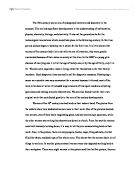Gender Roles in Combat Duty: Are Women Strong Enough for Combat?
There are growing feelings in the United States that women should be given an equal opportunity to serve the country as combat soldiers. Women and war have always been considered to have little in common. As the gentle sex, women are traditionally associated with caring and with creating life rather than with its destroying. And even though women today do have the opportunity to enter the army, they are not officially allowed to enter combat and fight alongside their male counterparts. The paper analyzes arguments both for and against women in combat. It also includes opinions from key strategic leaders, as well as opinions from women who have served in army.
In the first article “Policy and Culture: The Women in Combat Fight” written by Angelia D. Farnell, which discusses the policy on assigning women in the U.S military with particular focus on the combat exclusion clause. The differences between the policies of the Army and the department of Defense are examined (DoD). Varying opinions about the impact of women on military readiness are tackled (Angelia 15). Also explored is the influence of cultural norms on the way women were given assignments in the military based on history. In reports and various statistical studies on women’s assignments and combat from RAND Cooperation states that “the integration of women had no major effect on readiness, single mothers were compared to single fathers regarding the impact each had on the unit.” The study found that numerically, single fathers were more common in the military and that “single parents regardless of the gender placed a burden on the unit and impacted readiness” (Harrell and Miller 1997). There are a number of arguments in favor of women being excluded from front line fighting. The first, and probably the most obvious, argument is that, for the most part, they lack the body strength that is necessary to perform in combat. Because of this, they would have difficulties in handling the extremely heavy military equipment used on the field; the manipulation with a gun would take them longer, which would create an opportunity for the enemy to shoot first. Also, they would have problems when a need “arises to carry the body of a wounded comrade off the battlefield” (17). The second argument is that women do not possess the necessary mental strength and therefore they would not be able to cope with the mental and emotional stress involved. Women are generally considered to be very gentle, caring and compassionate. Because of these personality traits, they would have problems handling the atmosphere of fear and hostility that is inevitably generated on the battlefield. Thus, in the light of these arguments, it may seem to be a logical conclusion that women should not be allowed to fight in the front line (Women’s Policy Journal 15). However, it is crucial to note that the above arguments are based on the traditional image of a woman and are general statements rather than ultimate facts; in other words, it may not be true for every woman. While most women lack the necessary physical strength, some may be strong enough to perform in combat situations and they may even be able to meet the male fitness requirements. In the article it mentions that “Women fully understand and accept their military roles; they take the same oath as their male counterparts. That they are women does not preclude volunteering to defend our freedom; women and men both are making the ultimate sacrifice for their country” (Women’s Policy Journal 20-21).







